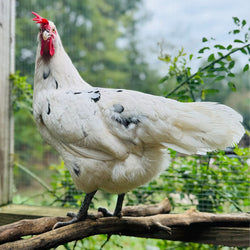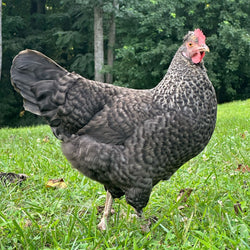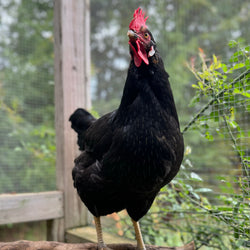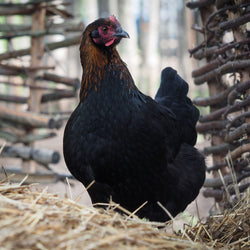page=45/--
Frequently Asked Questions
Here we answer the most commonly-asked questions about ordering, chicken care, and more.
How do I raise show quality chickens?
Well, it helps to start with good stock. Have a look at our special lines that are more likely to produce show quality prospects. You may also find good lines with specialized breeders. Just keep in mind that even with the very best lines, not every bird is going to be a winner of shows, not even for experienced exhibitors. Once you've got your stock, you'll want to provide high-quality food, and you may even want to weigh your birds frequently as they grow to make sure they're putting on weight fast enough---but not too fast! Make sure you're familiar...
Read MoreAll about Virulent Newcastle Disease
Virulent Newcastle Disease (VND) is no joke. It is easily spread among birds (wild and domestic), and once it is contracted, even birds that survive continue to be carriers of the virus, endangering all the birds around them. Because of this, VND is a reportable disease for which euthanasia is recommended. Read on to find out more: Virulent Newcastle Also called Pseudo-plague, Asiatic Newcastle, VVND, NVND, VND, Velogenic Newcastle, VN, Pneumoencephalitis, formerly called Exotic Newcastle Prevalence Rare Signs General signs Sudden death with no prior symptoms, or respiratory signs with a neurological component, including paralysis or partial paralysis of limbs,...
Read MoreAll about Domestic Newcastle disease
Domestic Newcastle Also called Newcastle Disease, Avian Distemper, Pseudofowl, ND, Parainfluenza, Fake Flu Prevalence Common Signs General signs - Coughing, sneezing, wheezing, lack of appetite, lethargy, huddling near heat source and fluffed-up down. Mucousy nares (nostrils). Occasionally layers exhibit a drop in laying and misshapen eggs. Some birds show signs of neurological disorders about two weeks after the respiratory illness. Mortality is low in backyard flocks with an owner who can isolate a bird until recovery. In large commercial flocks without close supervision, birds showing neurological symptoms can get picked to death. Cardinal or diagnostic signs - Lab ID, or...
Read MoreAll about Avian Infectious Bronchitis disease
Avian Infectious Bronchitis is a respiratory illness that results in death in about 5% of the birds that contract it, and may cause a permanent reduction in laying or reduce the quality of eggs in hens that survive it. As with all avian diseases, practicing good biosecurity will go a long way toward protecting your birds from this virus. Read on to find out more. Avian Infectious Bronchitis Also called IB, IBV, Infectious Bronchitis, Cold Prevalence Common Signs General signs Coughing, sneezing, lack of appetite, lethargy, huddling near heat source and fluffed up down. Mucousy eyes or nares (nostrils). Thirst...
Read MoreWhat is NPIP and why should I purchase only from NPIP breeders?
NPIP stands for National Poultry Improvement Plan, and it's a voluntary certification system that poultry breeders and hatcheries can participate in. (Our hatchery and all breeders associated with My Pet Chicken are NPIP certified.) Essentially, NPIP certification means you submit the birds in your breeding flock to regularly scheduled testing to assure they are Pullorum-Typhoid-free. While NPIP participation is voluntary, typically states have certification or monitoring requirements if you want to ship birds into that state, so large hatcheries all participate. (At the time of this writing, we don't know of a major hatchery that isn't NPIP certified.) Pullorum and...
Read MoreWhat should I consider when choosing a waterer for my flock?
As you probably know by now, it's not a good idea -- at all -- to simply give chickens a bowl of water like you would a dog or a cat. They'll dirty it; they'll step in it and tip it over; they may even unintentionally poo in it. Here are 7 important questions to ask yourself when choosing a waterer for your flock: How many thirsty birds do you have? You need to make sure there is adequate access to water for all the birds in your flock. If you have a large flock but only one small waterer,...
Read MoreCan I cancel or change my order for juvenile 6 week old chickens (started pullets)?
Yes, we're happy to cancel or change an order of juvenile chickens provided you let us know by the week before your scheduled ship week. For juvenile chickens, if you want to cancel or change your order, that must be done by the Thursday before the shipping week. As you remember from checkout, your order cannot be cancelled (or changed) later than that date. Be sure to have your order number at hand so we can find your order to cancel it. In addition, you should be aware that you may be charged a $10 order cancellation fee. If you've...
Read MoreWhat is a lash egg?
A lash egg is less of an egg than it is a roughly egg- or sausage-shaped exudate, consisting of thickened pus and other materials. It is probably the grossest egg your hen will ever lay, and will often look like cheesy, bloody strata or other matter arranged in strappy, skin-like layers. You may think she's expelled an internal organ. Ew. Seriously. If your hen lays a lash egg, it means she is sick with salpingitis, which is an infection of the oviduct. Please take her to a veterinarian immediately.
Read More







"The Clubhouse" Coop
Easy to assemble and built to last, the Clubhouse Coop is the perfect starter coop for a small flock.











